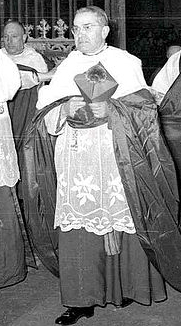Benjamin de Arriba y Castro

Benjamin Cardinal de Arriba y Castro (born April 8, 1886 in La Ferrería , Santa María de Peñamayor , Lugo , Galicia ; † March 8, 1973 in Barcelona , Catalonia ) was Roman Catholic Archbishop of Tarragona in Spain.
Life
The son Antonio de Arribas and Pilar Castros moved with his family to Madrid at the age of nine . He studied at the seminary in Madrid, the Pontifical Gregorian University in Rome , the Pontifical University of Toledo and the Pontifical Academy of St. Thomas Aquinas . In Rome he was a seminarian at the Pontifical Spanish College . He was ordained a priest on July 14, 1912 in Rome by the Cardinal Secretary of State , Rafael Cardinal Merry del Val y Zulueta . From 1913 to 1921 he taught at the seminary in Madrid and was appointed canon of the cathedral chapter of Madrid. From 1921 to 1930 he was secretary of the diocesan chamber and then advisor, vicar general and finally vicar general from 1932 to early 1935.
Pope Pius XI appointed him on May 1, 1935 Bishop of Mondoñedo . The Bishop of Madrid , Leopoldo Eijo y Garay , donated him episcopal ordination on June 16 of the same year ; Co- consecrators were Prudencio Melo y Alcalde , Archbishop of Valencia , and Manuel González y García , Bishop of Málaga . As a motto he chose Los ataré con atadura de amor (traían os in vinculas caritativas) .
He was appointed Bishop of Oviedo on August 8, 1944, and took office on October 29 of the same year. On January 22, 1949 he was appointed Archbishop of Tarragona . Pius XII. took him on January 12, 1953 as a cardinal priest with the titular church Santi Vitale, Valeria, Gervasio e Protasio in the college of cardinals . He took part in the conclaves in 1958 and 1963 . He resigned from his office on November 19, 1970.
He died on March 8, 1973 at 3:45 p.m. in Barcelona at the age of 86 and is buried in an unadorned grave in the floor of a parish church in Tarragona.
Views
He participated in the Second Vatican Council , spoke on behalf of sixty Spanish bishops in October 1963 in the debate on the regulation of the Virgin Mary and supported the need for a separate document on Mariology because of the special importance of the Mother of God in the economy of salvation . However, the Virgin was later included in the Church document without mentioning the title of co-redeemer . Again in November of this year he took part in the debate on ecumenism to emphasize once again that the teaching of Christ has been entrusted only to the Catholic Church and that it has the right and the duty to preach the gospel throughout the world.
On September 15, 1965, at the fourth session of the Council, he reaffirmed the same idea in the debate on religious freedom , the future Dignitatis humanae declaration . Only the Catholic Church has the right and the duty to preach the gospel. This is why the missionary work of Catholics by non-Catholics is illegal and must be prevented not only by the church but also by the state in order to preserve the common good. The council should therefore not ruin the Catholic religion in countries where this religion is almost unique. Indeed, many, especially among the unsuspecting, say that all religions seem to be the same. And finally he said: Well, no and it's important.
Honors
- Cruz de Mérito Naval, con distintivo blanco
- Grand Cross of the Order de Isabel la Católica (1949)
- Grand Cross of the Order of Alfonso X the Wise (1952)
- Grand Cross of the Civil Order of San Raimundo de Peñafort (1960)
- Grand Cross of the Order of Charles III. (1964)
- Grand Cross of the Military Order of Merit, con distintivo blanco
- Medalla de Oro de la Juventud y Medalla de Oro de Tarragona
- Medalla de Duarte of the Dominican Republic .
- hijo Predilecto (actually "favorite child"), an honorary citizen of the province of Lugo
- Hijo adoptivo (actually "adoptive child") thus honorary citizens of Alforja , Montblanc , Riudoms , Ferrol and Cardedeu
Web links
- Arriba y Castro, Benjamin de. In: Salvador Miranda : The Cardinals of the Holy Roman Church. ( Florida International University website), accessed August 6, 2016.
- Entry on Benjamín de Arriba y Castro on catholic-hierarchy.org ; accessed on August 6, 2016.
- Biography of Benjamín de Arriba y Castro
- Biography of Benjamín de Arriba y Castro (Spanish)
| predecessor | Office | successor |
|---|---|---|
| Juan Solís y Fernández |
Bishop of Mondoñedo 1935–1944 |
Fernando Quiroga y Palacios |
| Manuel Arce y Ochotorena |
Bishop of Oviedo 1944–1949 |
Francisco Lauzurica y Torralba |
| Manuel Cardinal Arce y Ochotorena |
Archbishop of Tarragona 1949–1970 |
José Pont y Gol |
| personal data | |
|---|---|
| SURNAME | Arriba y Castro, Benjamin de |
| BRIEF DESCRIPTION | Spanish clergyman, archbishop, cardinal of the Roman Catholic Church |
| DATE OF BIRTH | April 8, 1886 |
| PLACE OF BIRTH | La Ferrería , Santa María de Peñamayor , Lugo , Galicia |
| DATE OF DEATH | March 8, 1973 |
| Place of death | Barcelona , Catalonia |